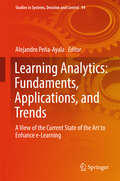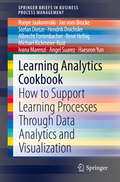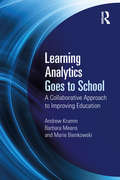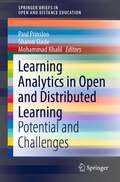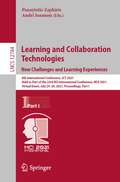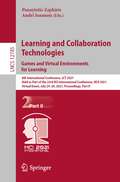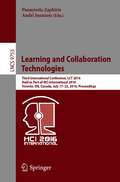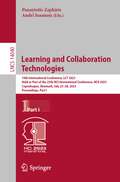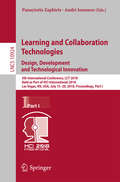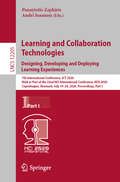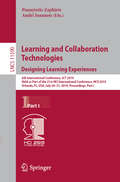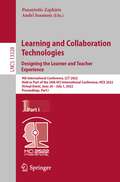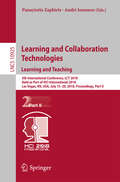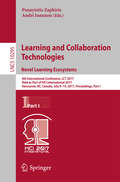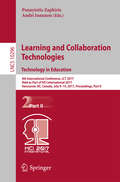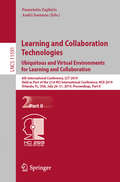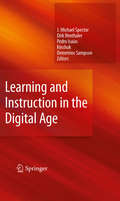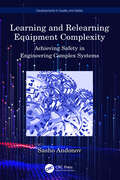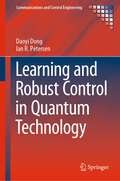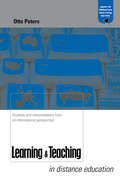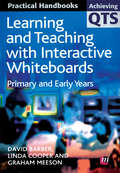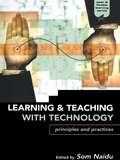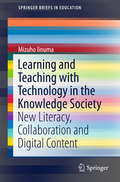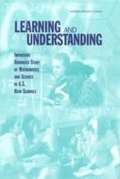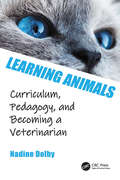- Table View
- List View
Learning Analytics: Fundaments, Applications, and Trends
by Alejandro Peña-AyalaThis book provides a conceptual and empirical perspective on learning analytics, its goal being to disseminate the core concepts, research, and outcomes of this emergent field. Divided into nine chapters, it offers reviews oriented on selected topics, recent advances, and innovative applications. It presents the broad learning analytics landscape and in-depth studies on higher education, adaptive assessment, teaching and learning. In addition, it discusses valuable approaches to coping with personalization and huge data, as well as conceptual topics and specialized applications that have shaped the current state of the art. By identifying fundamentals, highlighting applications, and pointing out current trends, the book offers an essential overview of learning analytics to enhance learning achievement in diverse educational settings. As such, it represents a valuable resource for researchers, practitioners, and students interested in updating their knowledge and finding inspirations for their future work.
Learning Analytics Cookbook: How to Support Learning Processes Through Data Analytics and Visualization (SpringerBriefs in Business Process Management)
by Roope Jaakonmäki Stefan Dietze Hendrik Drachsler Albrecht Fortenbacher René Helbig Michael Kickmeier-Rust Ivana Marenzi Angel Suarez Haeseon Yun Jan vom BrockeThis book offers an introduction and hands-on examples that demonstrate how Learning Analytics (LA) can be used to enhance digital learning, teaching and training at various levels. While the majority of existing literature on the subject focuses on its application at large corporations, this book develops and showcases approaches that bring LA closer to smaller organizations, and to educational institutions that lack sufficient resources to implement a full-fledged LA infrastructure. In closing, the book introduces a set of software tools for data analytics and visualization, and explains how they can be employed in several LA scenarios.
Learning Analytics Goes to School: A Collaborative Approach to Improving Education
by Andrew Krumm Barbara Means Marie BienkowskiLearning Analytics Goes to School presents a framework for engaging in education research and improving education practice through the use of newly available data sources and analytical approaches. The application of data-intensive research techniques to understanding and improving learning environments has been growing at a rapid pace. In this book, three leading researchers convey lessons from their own experiences—and the current state of the art in educational data mining and learning analytics more generally—by providing an explicit set of tools and processes for engaging in collaborative data-intensive improvement.
Learning Analytics in Open and Distributed Learning: Potential and Challenges (SpringerBriefs in Education)
by Paul Prinsloo Sharon Slade Mohammad KhalilThis book explores and further expands on the rich history of theoretical and empirical research in open and distributed learning, and addresses the impact of the “data revolution” and the emergence of learning analytics on this increasingly diverse form of educational delivery. Following an introductory chapter that maps the book’s conceptual rationale, the book discusses the potential, challenges and practices of learning analytics in various open and distributed contexts. A concluding chapter briefly summarises the chapters before providing a tentative future research agenda for learning analytics in open and distributed environments.
Learning and Collaboration Technologies: 8th International Conference, LCT 2021, Held as Part of the 23rd HCI International Conference, HCII 2021, Virtual Event, July 24–29, 2021, Proceedings, Part I (Lecture Notes in Computer Science #12784)
by Panayiotis Zaphiris Andri IoannouThis two-volume set LNCS 12784 and 12785 constitutes the refereed proceedings of the 8th International Conference on Learning and Collaboration Technologies, LCT 2021, held as Part of the 23rd International Conference, HCI International 2021, which took place in July 2021. Due to COVID-19 pandemic the conference was held virtually.The total of 1276 papers and 241 poster papers included in the 39 HCII 2021 proceedings volumes was carefully reviewed and selected from 5222 submissions. The regular papers of LCT 2021, Part I, are organized in topical sections named: Designing and Developing Learning Technologies; Learning, Teaching and Collaboration Experiences; On-line vs. in Class Learning in Pandemic Times.
Learning and Collaboration Technologies: 8th International Conference, LCT 2021, Held as Part of the 23rd HCI International Conference, HCII 2021, Virtual Event, July 24–29, 2021, Proceedings, Part II (Lecture Notes in Computer Science #12785)
by Panayiotis Zaphiris Andri IoannouThis two-volume set LNCS 12774 and 12775 constitutes the refereed proceedings of the 8th International Conference on Learning and Collaboration Technologies, LCT 2021, held as Part of the 23rd International Conference, HCI International 2021, which took place in July 2021. Due to COVID-19 pandemic the conference was held virtually. The total of 1276 papers and 241 poster papers included in the 39 HCII 2021 proceedings volumes was carefully reviewed and selected from 5222 submissions. The regular papers of LCT 2021, Part II, focus on Games and Gamification in Learning; Chatbots in Learning; AR, VR and Robots in Learning.
Learning and Collaboration Technologies: Third International Conference, LCT 2016, Held as Part of HCI International 2016, Toronto, ON, Canada, July 17-22, 2016, Proceedings (Lecture Notes in Computer Science #9753)
by Panayiotis Zaphiris Andri IoannouThis book constitutes the refereed proceedings of the Third International Conference on Learning and Collaboration Technologies, LCT 2016, held as part of the 18th International Conference on Human-Computer Interaction, HCII 2016, in Toronto, Canada, in July 2016, in conjunction with 14 thematically similar conferences. The 1287 papers presented at the HCII 2016 conferences were carefully reviewed and selected from 4354 submissions. The papers cover the entire field of human-computer interaction, addressing major advances in knowledge and effective use of computers in a variety of application areas. The papers included in this volume are organized in the following thematic sections: instructional design; interaction techniques and platforms for learning; learning performance; web-based, mobile and ubiquitous learning; intelligent learning environments; learning technologies; collaboration technologies; and cultural and social aspects of learning and collaboration technologies.
Learning and Collaboration Technologies: 10th International Conference, LCT 2023, Held as Part of the 25th HCI International Conference, HCII 2023, Copenhagen, Denmark, July 23–28, 2023, Proceedings, Part I (Lecture Notes in Computer Science #14040)
by Panayiotis Zaphiris Andri IoannouThis two-volume set of LCT 2023, constitutes the refereed proceedings of the 10th International Conference on Learning and Collaboration Technologies, LCT 2023, held as Part of the 24th International Conference, HCI International 2023, which took place in July 2023 in Copenhagen, Denmark.The total of 1578 papers and 396 posters included in the HCII 2023 proceedings volumes was carefully reviewed and selected from 7472 submissions. The papers of LCT 2022 Part I are organized in topical sections named: Designing Learning Experiences; Understanding the Learning Experience; Technology-supported Teaching; Supporting Creativity in Learning.
Learning and Collaboration Technologies. Design, Development and Technological Innovation: 5th International Conference, LCT 2018, Held as Part of HCI International 2018, Las Vegas, NV, USA, July 15-20, 2018, Proceedings, Part I (Lecture Notes in Computer Science #10924)
by Panayiotis Zaphiris Andri IoannouThis two-volume set LNCS 10924 and 10925 constitute the refereed proceedings of the 5th International Conference on Learning and Collaboration Technologies, LCT 2018, held as part of the 20th International Conference on Human-Computer Interaction, HCII 2018, in Las Vegas, NV, USA in July 2018. The 1171 papers presented at HCII 2018 conferences were carefully reviewed and selected from 4346 submissions. The papers cover the entire field of human-computer interaction, addressing major advances in knowledge and effective use of computers in a variety of applications areas. The papers in this volume are organized in the following topical sections: designing and evaluating systems and applications, technological innovation in education, learning and collaboration, learners, engagement, motification, and skills, games and gamification of learning, technology-enhanced teaching and assessment, computing and engineering education.
Learning and Collaboration Technologies. Designing, Developing and Deploying Learning Experiences: 7th International Conference, LCT 2020, Held as Part of the 22nd HCI International Conference, HCII 2020, Copenhagen, Denmark, July 19–24, 2020, Proceedings, Part I (Lecture Notes in Computer Science #12205)
by Panayiotis Zaphiris Andri IoannouThis two-volume set LNCS 12205 and LNCS 12206 constitutes the proceedings of the 7th International Conference on Learning and Collaboration Technologies, LCT 2020, held as part of the 22nd International Conference, HCI International 2020, which took place in Copenhagen, Denmark, in July 2020.The total of 1439 papers and 238 posters included in the 37 HCII 2020 proceedings volumes was carefully reviewed and selected from 6326 submissions.The papers in this volume are organized in the following topical sections: designing and evaluating learning experiences; learning analytics, dashboards and learners models; language learning and teaching; and technology in education: policies and practice. As a result of the Danish Government's announcement, dated April 21, 2020, to ban all large events (above 500 participants) until September 1, 2020, the HCII 2020 conference was held virtually.
Learning and Collaboration Technologies. Designing Learning Experiences: 6th International Conference, LCT 2019, Held as Part of the 21st HCI International Conference, HCII 2019, Orlando, FL, USA, July 26–31, 2019, Proceedings, Part I (Lecture Notes in Computer Science #11590)
by Panayiotis Zaphiris Andri IoannouThis two-volume set LNCS 11590 and 11591 constitutes the refereed proceedings of the 6th International Conference on Learning and Collaboration Technologies, LCT 2019, held as part of the 21st International Conference on Human-Computer Interaction, HCII 2019, in Orlando, FL, USA in July 2019. The 1274 full papers and 209 posters presented at the HCII 2019 conferences were carefully reviewed and selected from 5029 submissions. The papers cover the entire field of human-computer interaction, addressing major advances in knowledge and effective use of computers in a variety of applications areas. The papers in this volume are organized in the following topical sections: designing and evaluating learning experiences; theoretical and pedagogical approaches in technology-enhanced learning; cognitive and psychological issues in learning; and technology in STEM education.
Learning and Collaboration Technologies. Designing the Learner and Teacher Experience: 9th International Conference, LCT 2022, Held as Part of the 24th HCI International Conference, HCII 2022, Virtual Event, June 26 – July 1, 2022, Proceedings, Part I (Lecture Notes in Computer Science #13328)
by Panayiotis Zaphiris Andri IoannouThis proceedings, LCT 2022, constitutes the refereed proceedings of the 9th International Conference on Learning and Collaboration Technologies, LCT 2022, held as Part of the 24th International Conference, HCI International 2022, which took place in June/July 2022. Due to COVID-19 pandemic the conference was held virtually.The total of 1271 papers and 275 poster papers included in the 39 HCII 2022 proceedings volumes was carefully reviewed and selected from 5487 submissions. The papers of LCT 2022 are organized in topical sections named: Designing and Developing Learning Technologies; Learning and Teaching Online; Diversity in Learning; Technology in Education: Practices and Experiences.
Learning and Collaboration Technologies. Learning and Teaching: 5th International Conference, LCT 2018, Held as Part of HCI International 2018, Las Vegas, NV, USA, July 15-20, 2018, Proceedings, Part II (Lecture Notes in Computer Science #10925)
by Panayiotis Zaphiris Andri IoannouThis two-volume set LNCS 10924 and 10925 constitute the refereed proceedings of the 5th International Conference on Learning and Collaboration Technologies, LCT 2018, held as part of the 20th International Conference on Human-Computer Interaction, HCII 2018, in Las Vegas, NV, USA in July 2018. The 1171 papers presented at HCII 2018 conferences were carefully reviewed and selected from 4346 submissions. The papers cover the entire field of human-computer interaction, addressing major advances in knowledge and effective use of computers in a variety of applications areas. The papers in this volume are organized in the following topical sections: designing and evaluating systems and applications, technological innovation in education, learning and collaboration, learners, engagement, motification, and skills, games and gamification of learning, technology-enhanced teaching and assessment, computing and engineering education.
Learning and Collaboration Technologies. Novel Learning Ecosystems
by Panayiotis Zaphiris Andri IoannouThe two-volume set LNCS 10295 and 10296 constitute the refereed proceedings of the 4th International Conference on Learning and Collaboration Technologies, LCT 2017, held as part of the 19th International Conference on Human-Computer Interaction, HCII 2017, in Vancouver, BC, Canada, in July 2017, in conjunction with 15 thematically similar conferences. The 1228 papers presented at the HCII 2017 conferences were carefully reviewed and selected from 4340 submissions.The papers cover the entire field of human-computer interaction, addressing major advances in knowledge and effective use of computers in a variety of application areas. The papers included in this volume are organized in the following topical sections: multimodal and natural interaction for learning; learning and teaching ecosystems; e-learning, social media and MOOCs; beyond the classroom; and games and gamification for learning.
Learning and Collaboration Technologies. Technology in Education
by Panayiotis Zaphiris Andri IoannouThe two-volume set LNCS 10295 and 10296 constitute the refereed proceedings of the 4th International Conference on Learning and Collaboration Technologies, LCT 2017, held as part of the 19th International Conference on Human-Computer Interaction, HCII 2017, in Vancouver, BC, Canada, in July 2017, in conjunction with 15 thematically similar conferences. The 1228 papers presented at the HCII 2017 conferences were carefully reviewed and selected from 4340 submissions.The papers cover the entire field of human-computer interaction, addressing major advances in knowledge and effective use of computers in a variety of application areas. The papers included in this volume are organized in the following topical sections: STEM education; diversity in learning; learning analytics; and improving the learning and collaboration experience.The chapter 'The Quality of MOOCs: How to Improve the Design of Open Education and Online Courses for Learners?' is Open Access under a CC BY 4.0 license.
Learning and Collaboration Technologies. Ubiquitous and Virtual Environments for Learning and Collaboration: 6th International Conference, LCT 2019, Held as Part of the 21st HCI International Conference, HCII 2019, Orlando, FL, USA, July 26–31, 2019, Proceedings, Part II (Lecture Notes in Computer Science #11591)
by Panayiotis Zaphiris Andri IoannouThis two-volume set LNCS 11590 and 11591 constitutes the refereed proceedings of the 6th International Conference on Learning and Collaboration Technologies, LCT 2019, held as part of the 21st International Conference on Human-Computer Interaction, HCII 2019, in Orlando, FL, USA in July 2019. The 1274 full papers 209 posters presented at the HCII 2019 conferences were carefully reviewed and selected from 5029 submissions. The papers cover the entire field of human-computer interaction, addressing major advances in knowledge and effective use of computers in a variety of applications areas. The papers in this volume are organized in the following topical sections: mobile and ubiquitous learning; virtual reality and augmented reality systems for learning; and collaborative technology.
Learning and Instruction in the Digital Age
by J. Michael SpectorInstruction tailored to the individual student, learning and teaching outside the limits of time and space--ideas that were once considered science fiction are now educational reality, with the prospect of an intelligent Web 3.0 not far distant. Alongside these innovations exists an emerging set of critical-thinking challenges, as Internet users create content and learners (and teachers) take increased responsibility in their work. Learning and Instruction in the Digital Age nimbly balances the technological and pedagogical aspects of these rapid changes, gathering papers from noted researchers on a wealth of topics relating to cognitive approaches to learning and teaching, mental models, online learning, communications, and innovative educational technologies, among them: Cognition and student-centered, Web-based learning, The progression of mental models throughout a course of instruction, Experiencing education with 3D virtual worlds, Expanding educational boundaries through multi-school collaboration, Adapting e-learning to different learning styles, The student blog as reflective diary. With its blend of timely ideas and forward thinking, Learning and Instruction in the Digital Age will enrich the work of researchers in educational psychology, educational technology, and cognitive science.
Learning and Relearning Equipment Complexity: Achieving Safety in Engineering Complex Systems (Developments in Quality and Safety)
by Sasho AndonovWith industrial systems becoming ever more mechanized and reliant on advanced technology, the complexity of equipment, especially in risky industries, is increasing on a daily basis. A thorough understanding of operations and providing safety for these complex systems has become a firm requirement for many. This book offers the knowledge required by safety professionals to provide and maintain the safety of engineering complex systems. Through a scientific and engineering approach to designing, implementing, operating, and maintaining complex systems, Learning and Relearning Equipment Complexity: Achieving Safety in Engineering Complex Systems details the need for more engineering and scientific knowledge to understand and maintain their safety. It gives clear explanations of reasons for a system’s complexity, based on control systems and non-linear dynamics. In addition, the book addresses the necessary changes in the approach and the procedures for the safety assessment of engineering complex systems. The reader will develop a thorough understanding of what complex systems are, why they are complex, and how they are utilized. This book will appeal to any safety professional tasked with complex systems. This extends to professionals in risky industries such as aviation, nuclear power, chemicals, railway and transport, and pharmaceuticals.
Learning and Robust Control in Quantum Technology (Communications and Control Engineering)
by Daoyi Dong Ian R. PetersenThis monograph provides a state-of-the-art treatment of learning and robust control in quantum technology. It presents a systematic investigation of control design and algorithm realisation for several classes of quantum systems using control-theoretic tools and machine-learning methods. The approaches rely heavily on examples and the authors cover:sliding mode control of quantum systems;control and classification of inhomogeneous quantum ensembles using sampling-based learning control;robust and optimal control design using machine-learning methods;robust stability of quantum systems; and H∞ and fault-tolerant control of quantum systems. Both theoretical algorithm design and potential practical applications are considered. Methods for enhancing robustness of performance are developed in the context of quantum state preparation, quantum gate construction, and ultrafast control of molecules.Researchers and graduates studying systems and control theory, quantum control, and quantum engineering, especially from backgrounds in electrical engineering, applied mathematics and quantum information will find Learning and Robust Control in Quantum Technology to be a valuable reference for the investigation of learning and robust control of quantum systems. The material contained in this book will also interest chemists and physicists working on chemical physics, quantum optics, and quantum information technology.
Learning and Teaching in Distance Education: Analyses and Interpretations from an International Perspective (Open and Flexible Learning Series)
by Otto PetersThis unique and comprehensive overview of open and distance education is written by one of the best known names in the field. It integrates historical, contemporary and future aspects of distance education. Packed with international case studies, it goes beyond looking at the methods and technology of distance education, giving Otto Peters' renowned visions on the sociological and social impacts of distance education.Now published in paperback for the first time, this new edition includes a new section on virtual universities. A major contribution to thinking on open and distance education, this new edition will reach an even wider audience.
Learning and Teaching with Interactive Whiteboards: Primary and Early Years (Achieving QTS Practical Handbooks Series)
by David Barber Linda Cooper Mr Graham MeesonInteractive Whiteboards (IWBs) are becoming increasingly common in schools and early years settings, and it is important for trainees to be equipped with the necessary skills and understanding to use them effectively to enhance learning. This book takes a thematic approach, examining all the key issues required to get the most out of this versatile learning technology. All chapters contain case studies from a range of subject areas and across the key stages, ensuring the text is rooted in the reality of the primary classroom and its curriculum.
Learning and Teaching with Technology: Principles and Practices (Open and Flexible Learning Series)
by Som NaiduIncreased use of electronic libraries, multimedia courseware and computer-mediated communication is giving rise to an entirely new educational experience, prompting educators to assess the potential for improved and enriched learning and teaching models. This new book explores the creative opportunities offered by ICT, and provides an authoritative, rigorous survey of the ways in which ICT is currently transforming core teaching functions, including: *subject matter representation*activating learning and the engagement of students*supporting interaction and socialization*assessing learning outcomes*providing feedback to students. Written by leading experts in the field, this text draws on the experiences of practitioners at the forefront of ICT developments, making this essential reading for all educational professionals who recognize the new opportunities afforded by this changed environment. Suitable for those who are open and flexible learning specialists, educational technologists or educational developers in either a conventional or an e-learning environment.
Learning and Teaching with Technology in the Knowledge Society
by Mizuho IinumaThis book discusses learning and teaching with modern technology in the new knowledge society. It focuses specifically on new literacy and technology in classroom environments. Based on a social-constructivist approach, this book covers a wide range of new technology use examples, such as participatory media, video recording systems and 3D computer graphics. A case study on a constructivist approach to teaching and learning, especially CSCL (computer supported collaborative learning), is discussed from a practical perspective for educators. It also includes specific in-class practices with detailed accounts of curricula featuring readily accessible yet new technology available for classroom use, such as Google Sketchup 3D computer models.
Learning And Understanding: Improving Advanced Study Of Mathematics And Science In U.s. High Schools
by Committee on Programs for Advanced Study of Mathematics Science in American High SchoolsThis book takes a fresh look at programs for advanced studies for high school students in the United States, with a particular focus on the Advanced Placement and the International Baccalaureate programs, and asks how advanced studies can be significantly improved in general. It also examines two of the core issues surrounding these programs: they can have a profound impact on other components of the education system and participation in the programs has become key to admission at selective institutions of higher education.By looking at what could enhance the quality of high school advanced study programs as well as what precedes and comes after these programs, this report provides teachers, parents, curriculum developers, administrators, college science and mathematics faculty, and the educational research community with a detailed assessment that can be used to guide change within advanced study programs.
Learning Animals: Curriculum, Pedagogy and Becoming a Veterinarian
by Nadine DolbyWe are surrounded by thousands of animals, alive and dead. They are an intimate and ever-present part of our human lives. As a society, we privilege veterinarians as experts on these animals: they are our educators and teachers in what they say, what they do, and the decisions that they make. Yet, within the field of education, there is little research on the curriculum, pedagogy, and experiences of veterinary school and students. What do veterinarians learn in veterinary school? How do their experiences during those four years shape their perceptions of animals? How do the structures, curriculum, and pedagogy of veterinary college create and influence these experiences? Learning Animals opens up this conversation through an exploration of the complicated, fascinating and often painful stories of a cohort of veterinary students as they make their four-year journey from matriculation through graduation. The book examines how the experiences of veterinary students shape how humans relate to animals, from public policy and decision-making about the environment and animals slaughtered for food, to the most personal decisions about euthanizing companion animals. The first full-length, critical, qualitative study of the perspectives of our primary teachers about animals, this will be a thought-provoking read for those in the fields of both educational research and veterinary education.
